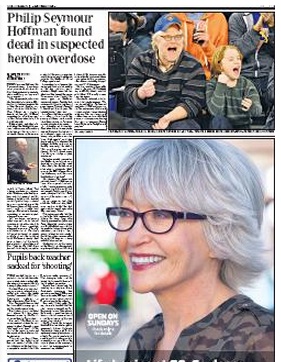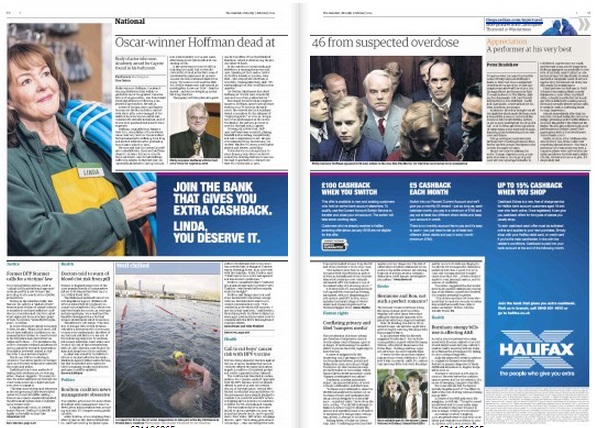The art of Sunday editing: make sure the specials add up and be ready to throw them out if a real story breaksMonday 3 February, 2014
Like most bosses, newspaper editors enjoy perks that are not available to their staff. One of these is the right to Sundays off. Funnily enough, this tends not to cause resentment because it affords people lower down the pecking order - including those who have little to do with the news operation in their 'day job' - to play with the train set. Monday newspapers therefore often have a different tone from the rest of the week. Much of the content will have been planned ahead, there will be new series or campaigns and there will be follow-ups from the weekend papers and current affairs programmes. Andrew Marr has a big part to play here. It doesn't leave much room for a Sunday editor to make his or her mark. They will be judged on headline, presentation and, most of all, how they react to that rare thing - a breaking story. We can see all this at play today. Michael Gove has been everywhere over the weekend, so the row over Sally Morgan's dismissal was the easy splash option. Only the Guardian took that route, however. The Independent, which produced the stand-out front page, also went with Gove, and the claim that cost cutting has left sixth form colleges unable to afford to run maths A level courses. (Really? They may be short of cash, but isn't there something less important that they could drop?) The Mirror and the i have unearthed prison 'scandals' from Freedom of Information requests and statistical analysis. The i is concerned about dangerous sex offenders who are being released without having had any treatment to curb their behaviour. Economies mean that places on treatment programmes are becoming more scarce - 54 at Maidstone, where there are 500 sex offenders - and that the waiting list is so long that many prisoners are reaching the end of their sentences before they reach the top of the queue. How shocking is this? Clearly it's not a good thing, but is it putting the public at serious risk? Prison governors think it is, according to the writer Emily Dugan:
Prisons across England and Wales are routinely releasing dangerous sex offenders without putting them through treatment programmes because budget cuts have left places critically scarce. The situation is so serious that prison governors say it could create more victims, as sexual predators are sent into the community before their behaviour is addressed. But there is nothing to back up the key assertions in either paragraph - that dangerous offenders are routinely released without treatment or that prison governors are worried about there being more victims. No governor is quoted in the story; the line about creating more victims comes from an official of a charity that works to prevent child abuse. Nor do the inspection reports or the December National Audit Office report on which the story is based make any mention of dangerous prisoners. Indeed, the Prison Service says that medium and high-risk prisoners have priority for training programmes. Dugan has done well in ferreting around to get her story - but it has been over-egged to the extent that its value is diminished. |
|
Life after deathSt Peter had a hectic weekend with the deaths of Sir David Frost, Cliff Morgan, Seamus Heany, David Jacobs and Alan Hamilton of the Times. How did the news and obit pages respond?
Read SubScribe on the art of the obituarist here |
The Mirror is also concerned about prisoners - this time because some are being paid child and housing benefits, sick pay and even job seekers' allowance while they have been locked away from society. This 'blundering at Iain Duncan Smith's Department for Work and Pensions' led to £41m being paid out in error over six years, of which only £19.7m has been recovered. The Labour MP Grahame Morris and the TaxPayers' Alliance are obligingly outraged, with Morris suggesting that the money could have been used to recruit 2,500 more nurses.
IDS has made some crass mistakes and is an easy target. And it is accurate to say that the errors were perpetrated by officials at the department he now heads.
But the payments chief reporter Andy Lines is writing about were made between 2007 and 2012. According to the figures, £25.2m was paid between 2007 and 2010 - when Labour's James Purnell and Yvette Cooper were in charge - and £16m has been paid since IDS took over. The Mirror does not mention the Labour ministers, nor does it give credit to whoever was responsible for recovering the £19.7m.
It does, however, say that payments last year were £2m, which suggests the problem is being addressed, and that some prisoners are entitled to housing and child benefit.
This Government is getting enough wrong for it to be spared the blame for other people's errors.
Elsewhere, the floods still preoccupy the minds of news and picture editors. The Telegraph creates its splash (sorry) from an oped piece by Chris Smith about difficult choices on which areas should be protected from the water and there is some cute picture cropping to merge photographs of town and country to create a bold and coherent head-picture-story package.
But...
A news story broke yesterday afternoon; one that was of greater interest to more people than anything about the Davis Cup, romcoms or HS2. Yet the Telegraph had no space on its front for a single word about the death of
IDS has made some crass mistakes and is an easy target. And it is accurate to say that the errors were perpetrated by officials at the department he now heads.
But the payments chief reporter Andy Lines is writing about were made between 2007 and 2012. According to the figures, £25.2m was paid between 2007 and 2010 - when Labour's James Purnell and Yvette Cooper were in charge - and £16m has been paid since IDS took over. The Mirror does not mention the Labour ministers, nor does it give credit to whoever was responsible for recovering the £19.7m.
It does, however, say that payments last year were £2m, which suggests the problem is being addressed, and that some prisoners are entitled to housing and child benefit.
This Government is getting enough wrong for it to be spared the blame for other people's errors.
Elsewhere, the floods still preoccupy the minds of news and picture editors. The Telegraph creates its splash (sorry) from an oped piece by Chris Smith about difficult choices on which areas should be protected from the water and there is some cute picture cropping to merge photographs of town and country to create a bold and coherent head-picture-story package.
But...
A news story broke yesterday afternoon; one that was of greater interest to more people than anything about the Davis Cup, romcoms or HS2. Yet the Telegraph had no space on its front for a single word about the death of
|
Philip Seymour Hoffman. Perhaps the news came too late?
No. The actor made a perfunctory page 5 lead with a run-of-the-mill picture sitting awkwardly over a dominant 25x4 ad. So in the Telegraph's eyes, he was also less important/interesting than a photograph of an orchestra of Stradivari instruments or the risk to British pageantry of cuts to the armed forces that appeared on page 3. This was a big failing. The Guardian had three cutouts of him over the masthead pointing to its coverage on the 10-11 spread, where the advert again managed to murder the editorial. |
Newspapers are desperate for money and have to bow to increasingly outrageous demands of advertisers (both Times and Telegraph sold their sport supplement covers to Peugeot on Saturday), but these Halifax monstrosities really should be outlawed.
So it's hats off to the Independent's Sunday editor for being the only one to realise what people would want to read about this morning and giving over the top half of the front to Hoffman.
So it's hats off to the Independent's Sunday editor for being the only one to realise what people would want to read about this morning and giving over the top half of the front to Hoffman.








